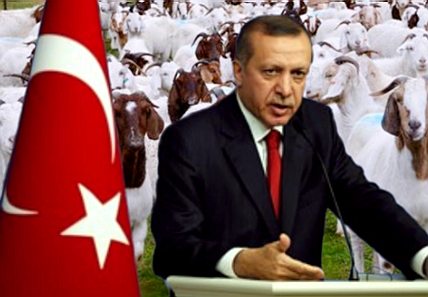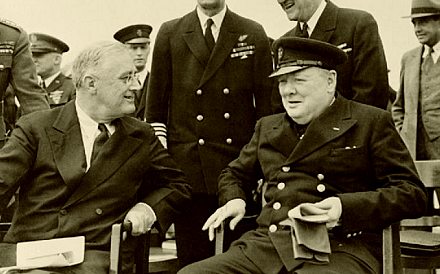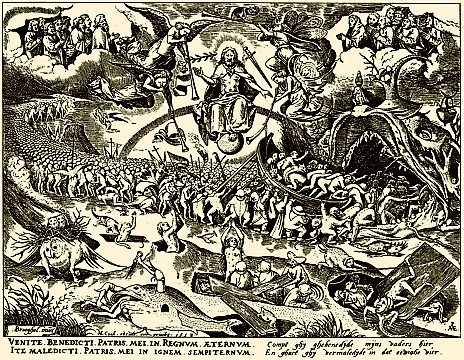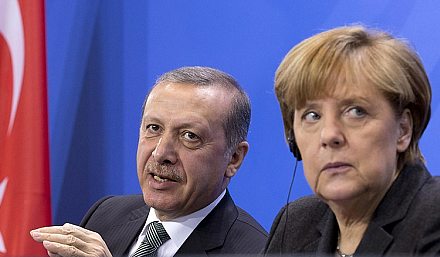Below is the latest essay by Thomas F. Bertonneau. The author includes this explanatory note:
The original of this essay first appeared at the now-dormant Brussels Journal on 11 December 2014. It was my last article to appear at that website before its dormancy. For republication at Gates of Vienna I have undertaken a major revision including the addition of an extensive set of “Afterthoughts.”
René Girard on the “Ontological Sickness”
by Thomas F. Bertonneau
This essay concerns the anthropology of the late René Girard (1923-2015), but it will be useful to begin with a slight detour.
Owen Barfield (1898-1997), the English philologist and literary critic, is not an author whom one casually connects with the natively French but long-naturalized American anthropological thinker René Girard, but one of Barfield’s coinages — the concept of “internalization,” which he develops in his History in English Words (1926) — makes a good introduction to Girard’s concept of “ontological sickness,” the proposed topic of the present discussion. Barfield uses his term “internalization” to designate an essential characteristic of modernity that can be traced back to the late Seventeenth Century only to reach a degree of alarming acuity three hundred and fifty years later. In both the Pagan order and the medieval Christian order, people grasped nature as vital and as having a reciprocal relation with the individual human being. This perception is rooted partly in the agricultural pattern of the classical and medieval societies, but is also powerfully intuitive irrespective of its context. Human beings under this intuition share the cosmos with other beings of various hierarchical orders, some of whom exert influence on people, as the planets and stars supposedly do according to the precepts of astrology. One need not take the propositions of the astrologer literally in acknowledging that, even by modern, skeptical criteria, his nowadays much-disparaged cosmic science grasps an essential truth: That every creature has an environment, with whose fluctuations the creature’s life remains intimately entangled.
In Barfield’s historical phenomenology of European consciousness, using the cumulus of meaning-changes of English-language words as his test-case, the modern phase of mental transformation takes the form, seemingly, of a deliberate retreat from the external world, no longer posited as the immediate environment of the percipient subject, with which that subject in reality has vital, reciprocal relations; and that retreat is the same as the de-vitalization and de-sacralization of the world, as remarked by others, most famously Max Weber. Some signs of this alteration, as cited by Barfield, are the degeneration of commonsensical skepticism into dogmatic skepticism; the philosophy of René Descartes, with his reduction of the individual to the cogito; the appearance of words like religionist and religiose which function in a purely pejorative way; and the appearances of other words prefixed with “self,” of which Barfield gives an extensive list. In Barfield’s narrative, the actively participatory consciousness gradually seeks refuge within the close boundaries of its own mind, which it now sees as totally other than the extended world. This mentality describes itself in lifeless, abstract terms. Experiencing itself as pure mind, it describes its environment in equally lifeless, abstract terms. The modern mentality studies the landscape and exploits it, but acknowledges no meaning in it until latterly so-called cognitive science explains consciousness itself as nothing but a meaningless algorithm.
Acknowledging no meaning is not the same, however, as experiencing no meaning. Another way of putting Barfield’s observation would be to describe the modern mentality as shrinking away from meaning — also as shrinking away from the admission that one person owes anything to another person or that lives are not pristinely isolated and immaculate but nastily mixed up with one another and that this is the very structure of human reality. It might well be — it certainly is — the case that the modern obsession with originality and uniqueness is a verbal sham, a game with words whereby the typically modern mentality denies, not only its relation to other living people, but also to the dead, that is, to a tradition that has established the language, the culture, the polity, and indeed the very possibility of having an opinion about any of those things. For a subject obsessed with the image of its independence and boundless creativity, such a qualification is intolerable.
All college and university instructors will testify to the sociological fact that today’s students are obsessed with their cell phones. Why should this be so? What is that urgent as to require such continuous instrumental vigilance? Barfield’s interpretation of modernity offers an explanation why late-adolescents, including tens of millions of chronological adults, are so fixated on handheld communication technology. They are the isolated ego, trapped in the granitic keep of the Cartesian cogito and they are desperately, blindly calling into the void for redemption from their imprisonment. Girard furnishes an explanation, too, as the exposition will show.
Girard’s work, like Barfield’s, offers an historical phenomenology of European consciousness over the last three or four hundred years, that is, the period of the emergence of modernity. Like Barfield, but, using quite different terms, Girard sees modernity as afflicted and in need of redemption; and again like Barfield he sees modern man’s malaise as deepening in its severity since the breakdown of traditional society during the Reformation, with its concerted attack on the meaningfulness of external ritual. The Enlightenment exacerbates the crisis. While I have referred to Girard as “an anthropological thinker,” it should be added that he began his authorial career in literary criticism, with his seminal Deceit Desire & the Novel (1962), a study in the novelistic treatment of envy and resentment from Miguel de Cervantes to Marcel Proust. Where Barfield pursued the metaphysical implications of literature, Girard became fascinated by the way in which sustained narrative reveals seemingly trivial quirks of human behavior that on inspection prove, not trivial, but fundamental, structuring the plot and becoming themes for sustained meditation. Although Deceit Desire & the Novel — in French, Mensonge romantique et vérité romanesque, that is, Romantic Lie and Novelistic Truth — presents itself as a literary study, its anthropological implications make the book exceptional in its genre. It eschews jargon, contents itself with plain language, and prefers observation of life and straightforward reading of the text to abstract theorizing.
What exactly does Girard discover in the Quixote, in Dostoyevsky’s Notes from Underground, and in the novels of Stendhal, Flaubert, and Proust?
 Girard discovers only what the novelists themselves have already discovered: “Mediated desire,” “triangular desire,” “external mediation,” and “internal mediation”; not to mention the “subjectivisms and objectivisms, romanticisms and realisms, individualisms and scientisms, idealisms and positivisms” — those ideologies of the sovereign self — that operate “to conceal the presence of the mediator” and so serve “the lie of spontaneous desire” that confers its resentfulness on modernity. In respect of that resentfulness, one would need to add to Girard’s list of dissimulations the distinctively modern theme of oppression by the wicked Other. Girard also discovers, along with his novelist-tutors, the mediated object. That would be the object that the desiring subject sees as originally his because he “does not want to be anyone’s disciple” in his choices; and again because he wishes to see his horizon of interest as “the emanation of a serene subjectivity” and “the creation ex nihilo of a quasi-divine ego” rather than as mere vain imitation, following on others. The first chapter of Deceit begins with a long epigraph from the Quixote in which the Don confesses to Sancho Panza that he has modeled his life after, and therefore adopted the quest (that is, the desire) of, Amadis of Gaul. Amadis was a chivalric hero whose exploits became popular in Spain early in the Sixteenth Century with the appearance of that new medium, the printed book. The Don’s follies are thus explicitly linked, by him, to the phenomenon of mimesis or imitation and through the image of the printed book to modernity.
Girard discovers only what the novelists themselves have already discovered: “Mediated desire,” “triangular desire,” “external mediation,” and “internal mediation”; not to mention the “subjectivisms and objectivisms, romanticisms and realisms, individualisms and scientisms, idealisms and positivisms” — those ideologies of the sovereign self — that operate “to conceal the presence of the mediator” and so serve “the lie of spontaneous desire” that confers its resentfulness on modernity. In respect of that resentfulness, one would need to add to Girard’s list of dissimulations the distinctively modern theme of oppression by the wicked Other. Girard also discovers, along with his novelist-tutors, the mediated object. That would be the object that the desiring subject sees as originally his because he “does not want to be anyone’s disciple” in his choices; and again because he wishes to see his horizon of interest as “the emanation of a serene subjectivity” and “the creation ex nihilo of a quasi-divine ego” rather than as mere vain imitation, following on others. The first chapter of Deceit begins with a long epigraph from the Quixote in which the Don confesses to Sancho Panza that he has modeled his life after, and therefore adopted the quest (that is, the desire) of, Amadis of Gaul. Amadis was a chivalric hero whose exploits became popular in Spain early in the Sixteenth Century with the appearance of that new medium, the printed book. The Don’s follies are thus explicitly linked, by him, to the phenomenon of mimesis or imitation and through the image of the printed book to modernity.
Continue reading →
 The leader of the Pirate Party in Germany was arrested by police for citing the poem that a TV satirist is being investigated (and possibly prosecuted) for. The same law that forbids insulting a foreign head of state — in this case, Turkish President Recep “Goatlover” Erdogan — was used to justify the arrest.
The leader of the Pirate Party in Germany was arrested by police for citing the poem that a TV satirist is being investigated (and possibly prosecuted) for. The same law that forbids insulting a foreign head of state — in this case, Turkish President Recep “Goatlover” Erdogan — was used to justify the arrest.

 I asked for a copy of Reliance of the Traveller*, in the translation approved by Al-Azhar. “Oh, we haven’t had that in for a very long time. I think it is out of print,” she said.
I asked for a copy of Reliance of the Traveller*, in the translation approved by Al-Azhar. “Oh, we haven’t had that in for a very long time. I think it is out of print,” she said.

 Girard discovers only what the novelists themselves have already discovered: “Mediated desire,” “triangular desire,” “external mediation,” and “internal mediation”; not to mention the “subjectivisms and objectivisms, romanticisms and realisms, individualisms and scientisms, idealisms and positivisms” — those ideologies of the sovereign self — that operate “to conceal the presence of the mediator” and so serve “the lie of spontaneous desire” that confers its resentfulness on modernity. In respect of that resentfulness, one would need to add to Girard’s list of dissimulations the distinctively modern theme of oppression by the wicked Other. Girard also discovers, along with his novelist-tutors, the mediated object. That would be the object that the desiring subject sees as originally his because he “does not want to be anyone’s disciple” in his choices; and again because he wishes to see his horizon of interest as “the emanation of a serene subjectivity” and “the creation ex nihilo of a quasi-divine ego” rather than as mere vain imitation, following on others. The first chapter of Deceit begins with a long epigraph from the Quixote in which the Don confesses to Sancho Panza that he has modeled his life after, and therefore adopted the quest (that is, the desire) of, Amadis of Gaul. Amadis was a chivalric hero whose exploits became popular in Spain early in the Sixteenth Century with the appearance of that new medium, the printed book. The Don’s follies are thus explicitly linked, by him, to the phenomenon of mimesis or imitation and through the image of the printed book to modernity.
Girard discovers only what the novelists themselves have already discovered: “Mediated desire,” “triangular desire,” “external mediation,” and “internal mediation”; not to mention the “subjectivisms and objectivisms, romanticisms and realisms, individualisms and scientisms, idealisms and positivisms” — those ideologies of the sovereign self — that operate “to conceal the presence of the mediator” and so serve “the lie of spontaneous desire” that confers its resentfulness on modernity. In respect of that resentfulness, one would need to add to Girard’s list of dissimulations the distinctively modern theme of oppression by the wicked Other. Girard also discovers, along with his novelist-tutors, the mediated object. That would be the object that the desiring subject sees as originally his because he “does not want to be anyone’s disciple” in his choices; and again because he wishes to see his horizon of interest as “the emanation of a serene subjectivity” and “the creation ex nihilo of a quasi-divine ego” rather than as mere vain imitation, following on others. The first chapter of Deceit begins with a long epigraph from the Quixote in which the Don confesses to Sancho Panza that he has modeled his life after, and therefore adopted the quest (that is, the desire) of, Amadis of Gaul. Amadis was a chivalric hero whose exploits became popular in Spain early in the Sixteenth Century with the appearance of that new medium, the printed book. The Don’s follies are thus explicitly linked, by him, to the phenomenon of mimesis or imitation and through the image of the printed book to modernity. We recently received a cash donation by snail-mail from someone who lives in the Chicago area. There was no return address or signature, so we were unable to send the donor a thank-you note.
We recently received a cash donation by snail-mail from someone who lives in the Chicago area. There was no return address or signature, so we were unable to send the donor a thank-you note. Today is William Shakespeare’s birthday, but the following excerpt is from Scene 3 of Doctor Faustus by Christopher Marlowe, a contemporary of Shakespeare’s. Faustus has just conjured up Mephistophilis and is about to negotiate the sale of his soul to Lucifer:
Today is William Shakespeare’s birthday, but the following excerpt is from Scene 3 of Doctor Faustus by Christopher Marlowe, a contemporary of Shakespeare’s. Faustus has just conjured up Mephistophilis and is about to negotiate the sale of his soul to Lucifer:




